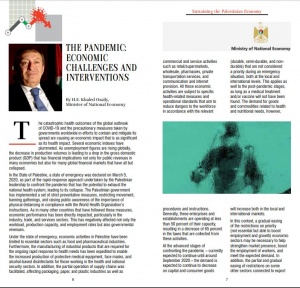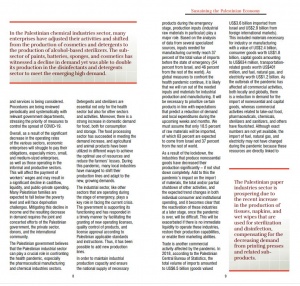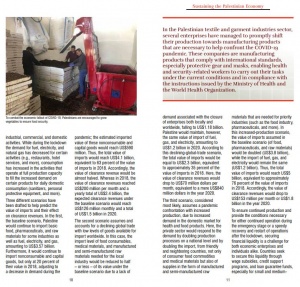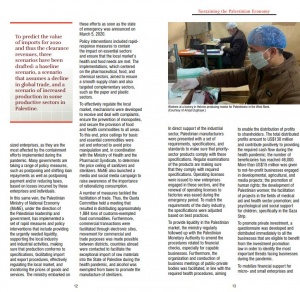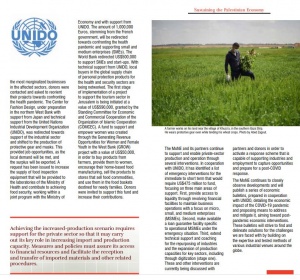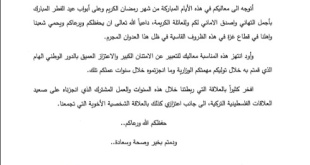The Pandemic: Economic Challenges and Interventions
By: H.E. Khaled Osaily, Minister of National Economy
The catastrophic health outcomes of the global outbreak of COVID-19 and the precautionary measures taken by governments worldwide in efforts to contain and mitigate its spread are causing an economic impact that is as significant as its health impact. Several economic indexes have plummeted. As unemployment figures are rising globally, the decrease in production volumes is leading to a drop in the gross domestic product (GDP) that has financial implications not only for public revenues in many economies but also for many global financial markets that have all but collapsed.
In the State of Palestine, a state of emergency was declared on March 5, 2020, as part of the rapid-response approach undertaken by the Palestinian leadership to confront the pandemic that has the potential to exhaust the national health system, leading to its collapse. The Palestinian government has implemented a set of strict preventative measures, restricting movement, banning gatherings, and raising public awareness of the importance of physical distancing in compliance with the World Health Organization’s instructions. As in many other countries that have followed these measures, economic performance has been directly impacted, particularly in the industry, trade, and services sectors. This has negatively affected not only the workload, production capacity, and employment rates but also governmental revenues.
Under the state of emergency, economic activities in Palestine have been limited to essential sectors such as food and pharmaceutical industries. Furthermore, the manufacturing of industrial products that are required for the ongoing rapid response to health needs has been expedited to enable the increased production of protective medical equipment, face masks, and alcohol-based disinfectants for those working in the health and national security sectors. In addition, the partial operation of supply chains was facilitated, affecting packaging, paper, and plastic industries as well as commercial and service activities such as retail/supermarkets, wholesale, pharmacies, private transportation services, and communication and internet provision. All these economic activities are subject to specific health-related measures and operational standards that aim to reduce dangers to the workforce in accordance with the relevant procedures and instructions. Generally, these enterprises and establishments are operating at less than 50 percent of their capacity, resulting in a decrease of 65 percent in the taxes that are collected from these activities.

At the advanced stages of confronting the pandemic – currently expected to continue until around September 2020 – the demand is expected to continue to decrease on capital and consumer goods (durable, semi-durable, and non-durable) that are not considered a priority during an emergency situation, both at the local and international levels. This applies as well to the post-pandemic stages, as long as a medical treatment and/or vaccine will not have been found. The demand for goods and commodities related to health and nutritional needs, however, will increase both in the local and international markets.
In the Palestinian chemical industries sector, many enterprises have adjusted their activities and shifted from the production of cosmetics and detergents to the production of alcohol-based sterilizers. The sub-sector of paints, batteries, sponges, and cosmetics has witnessed a decline in demand yet was able to double its production in the disinfectants and detergents sector to meet the emerging high demand.
In this context, a gradual easing of the restrictions on priority (not essential but able to boost employment and growth) economic sectors may be necessary to help strengthen market presence, boost the employment of workers, and meet the expected demand. In addition, the partial and gradual easing of restrictions on some other sectors connected to export and services is being considered. Procedures are being reviewed periodically and systematically with relevant government departments, stressing the priority of measures to control the spread of COVID-19.
Overall, as a result of the significant decrease in the operating rates of the various sectors, economic enterprises will struggle to pay their obligations, especially micro, small, and medium-sized enterprises, as well as those operating in the informal and productive sectors. This will affect the payment of workers’ wages and may result in a significant decline in cashflow, liquidity, and public-private spending. Many Palestinian families are expected to fall below the poverty level and will face deprivation challenges. Mitigating this decline in income and the resulting decrease in demand requires the joint and concerted efforts of the Palestinian government, the private sector, donors, and the international community.
The Palestinian government believes that the Palestinian industrial sector can play a crucial role in confronting the health pandemic, especially the pharmaceutical manufacturing and chemical industries sectors. Detergents and sterilizers are essential not only for the health sector but also for other sectors and activities. Moreover, there is a strong increase in domestic demand for food, both for consumption and storage. The food processing sector has succeeded in meeting the demand increase, and agricultural and animal products have been utilized in different ways to achieve the optimal use of resources and reduce the farmers’ losses. During this pandemic, many local industries have managed to shift their production lines and adapt to the new, growing demands.
The industrial sector, like other sectors that are operating during the stage of emergency, plays a key role in facing the current crisis. The government is supporting its functioning and has responded in a timely manner by facilitating the granting of new operating licenses, quality control of products, and license approval according to Palestinian applicable standards and instructions. Thus, it has been possible to add new production lines.
In order to maintain industrial production capacity and ensure the national supply of necessary products during the emergency stage, production inputs (industrial raw materials in particular) play a major role. Based on the analysis of data from several specialized sources, inputs needed for manufacturing currently reach 37 percent of the total value of imports before the state of emergency (54 percent from Israel, and 46 percent from the rest of the world). As global measures to confront the health pandemic continue, it is likely that we will run out of the needed inputs and materials for industrial production and manufacturing. It will be necessary to prioritize certain products in line with expectations that predict a reduction of demand and local expenditures during the upcoming weeks and months. We must assume that only 18.5 percent of raw materials will be imported, of which 63 percent are expected to come from Israel and 37 percent from the rest of world.
As a result of the lockdown, the industries that produce nonessential goods have decreased their production significantly – if not shut down completely. Add to this the pandemic’s impact on the import of materials, the total and/or partial shutdown of other activities, and the expected trend changes in both individual consumer and institutional spending, and it becomes clear that the reactivation of these industries at a later stage, once the pandemic is over, will be difficult. This will be exacerbated if there is no immediate liquidity to operate these industries, restore their production capabilities, or enable their marketing abilities.
The Palestinian paper industries sector is prospering due to the recent increase in the production of tissues, napkins, and wet wipes that are used for sterilization and disinfection, compensating for the decreasing demand from printing presses and related sub-products.
Trade is another commercial activity affected by the pandemic. In 2018, according to the Palestinian Central Bureau of Statistics, the total volume of imports amounted to US$6.5 billion (goods valued US$3.6 billion imported from Israel and US$2.9 billion from foreign international markets). This included materials necessary for industry or manufacturing with a value of US$2.4 billion, consumer goods worth US$1.8 billion, capital goods amounting to US$634 million, transportation-related goods worth US$401 million, and fuel, natural gas, and electricity worth US$1.2 billion. As the outbreak of the pandemic has affected all commercial activities, both locally and globally, there is a reduction in demand for the import of nonessential and capital goods, whereas commercial activities related to take-out food, pharmaceuticals, chemicals, sterilizers and sanitizers, and others have flourished. Although exact numbers are not yet available, the import of fuel, natural gas, and electricity may not have changed during the pandemic because these resources are directly linked to industrial, commercial, and domestic activities. While during the lockdown the demand for fuel, electricity, and natural gas has decreased for certain activities (e.g., restaurants, hotel services, and more), consumption has increased in the activities that operate at full production capacity to fill the increased demand on certain products for daily domestic consumption (sanitizers, personal protective equipment, and more).

Three different scenarios have been drafted to help predict the value of imports and their effect on clearance revenues. In the first, the baseline scenario, Palestine would continue to import basic food, pharmaceuticals, and raw materials for some industries as well as fuel, electricity, and gas, amounting to US$3.57 billion. Furthermore, it would continue to import nonconsumable and capital goods, but only at 20 percent of their value in 2018, adjusting to a decrease in demand during the pandemic; the estimated imported value of these nonconsumable and capital goods would reach US$590 million. Thus, the total value of imports would reach US$4.1 billion, equivalent to 63 percent of the value of imports in 2018. Accordingly, the value of clearance revenue would be almost halved. Whereas in 2018, the value of clearance revenues reached US$200 million per month and a yearly total of US$2.4 billion, the expected clearance revenues under the baseline scenario would reach US$126 million monthly and a total of US$1.5 billion in 2020.
The second scenario assumes and accounts for a declining global trade with low levels of goods available for import worldwide. In this case, the import level of food consumables, medical materials, and manufactured and semi-manufactured raw materials needed for the local industry would be reduced to half – or less – of its value under the baseline scenario due to a lack of demand associated with the closure of enterprises both locally and worldwide, falling to US$1.18 billion. Palestine would maintain, however, the same value of import of fuel, gas, and electricity, amounting to US$1.2 billion in 2020. According to this declining-global-trade scenario, the total value of imports would be equal to US$2.3 billion, equivalent to approximately 35 percent of the value of imports in 2018. Here, the value of clearance revenues would drop to US$70 million dollars per month, equivalent to a mere US$840 million dollars in the year 2020.
In the Palestinian textile and garment industries sector, several enterprises have managed to promptly shift their production towards manufacturing products that are necessary to help confront the COVID-19 pandemic. These companies are manufacturing products that comply with international standards, especially protective gear and masks, enabling health and security-related workers to carry out their tasks under the current conditions and in compliance with the instructions issued by the Ministry of Health and the World Health Organization.
The third scenario, considered most likely, assumes a pandemic confrontation with increased production, due to increased demand in the domestic market for health and food products. Here, the private sector would respond to the demand by doubling production processes on a national level and by doubling the import, from friendly and neighboring countries, not only of consumer food commodities and medical materials but also of supplies in the form of manufactured and semi-manufactured raw materials that are needed for priority industries (such as the food industry, pharmaceuticals, and more). In this increased-production scenario, the value of imports assumed in the baseline scenario (of food, pharmaceuticals, and raw materials) would be doubled (US$3.8 billion), while the import of fuel, gas, and electricity would remain the same (US$1.2 billion). Thus, the total value of imports would reach US$5 billion, equivalent to approximately 76 percent of the value of imports in 2018. Accordingly, the value of clearance revenues would drop to US$153 million per month or US$1.8 billion in the year 2020.
To ensure continued production and provide the conditions necessary for either continued operation during the emergency stage or a speedy recovery and restart of operations after the lockdown, securing financial liquidity is a challenge for both economic enterprises and individuals alike. Countries seek to secure this liquidity through wage subsidies, credit support programs, and loan guarantee funds, especially for small and medium-sized enterprises, as they are the most affected by the containment efforts implemented during the pandemic. Many governments are taking a range of policy measures, such as postponing and shifting loan repayments as well as postponing payment and/or reducing taxes, based on losses incurred by these enterprises and individuals.
To predict the value of imports for 2020 and thus the clearance revenues, three scenarios have been drafted: a baseline scenario, a scenario that assumes a decline in global trade, and a scenario of increased production in some productive sectors in Palestine.
In this same vein, the Palestinian Ministry of National Economy (MoNE), under the direction of the Palestinian leadership and government, has implemented a set of rapid measures and policy interventions that include providing the urgently needed liquidity, supporting the local industry and industrial activities, making sure that production conforms to specifications, facilitating import and export procedures, effectively regulating the local market, and monitoring the prices of goods and services. The ministry embarked on these efforts as soon as the state of emergency was announced on March 5, 2020.
Policy interventions included rapid-response measures to contain the impact on essential sectors and ensure that the local market’s health and food needs are met. The implementations, which centered on the pharmaceutical, food, and chemical sectors, aimed to ensure a smooth supply chain and also targeted complementary sectors, such as the paper and plastic sectors.
To effectively regulate the local market, mechanisms were developed to receive and deal with complaints, ensure the prevention of monopolies, and secure the provision of food and health commodities to all areas. To this end, price ceilings for basic and essential commodities were set and enforced to avoid price manipulation and, in coordination with the Ministry of Health and the Pharmacist Syndicate, to determine the price ceiling of sanitizers and sterilizers. MoNE also launched a media and social media campaign to raise awareness of the importance of rationalizing consumption.
A number of measures tackled the facilitation of trade. Thus, the Quota Committee held a meeting that resulted in distributing approximately 1,884 tons of customs-exempted food commodities. Furthermore, commercial transactions were facilitated through electronic sites, movement for commercial and trade purposes was made possible between districts, countries abroad were contacted to facilitate the exceptional import of raw materials into the State of Palestine during the health pandemic, and alcohol was exempted from taxes to promote the manufacture of sterilizers.
In direct support of the industrial sector, Palestinian manufacturers were presented with a set of requirements, specifications, and standards to make sure that priority-sector products comply with these specifications. Regular examinations of the products are making sure that they comply with required specifications. Operating licenses were issued to new enterprises engaged in these sectors, and the renewal of operating licenses to factories was eased during the emergency period. To match the requirements of the dairy industry, the specifications were adjusted based on best practices.

To provide liquidity in the Palestinian market, the ministry regularly followed up with the Palestinian Monetary Authority to amend the procedures related to financial checks, especially for capable businesses. Furthermore, the organization and conduction of business meetings of public-private bodies was facilitated, in line with the required health procedures, aiming to enable the distribution of profits to shareholders. The total distributed profits amount to US$130 million and contribute positively to providing the required cash flow during the health pandemic; the number of beneficiaries has reached 46,000. More than US$15 million was given to not-for-profit businesses engaged in developmental, agricultural, and media projects; the promotion of human rights; the development of Palestinian women; the facilitation of projects in the fields of medical aid and health sector promotion; and psychological and social support for children, specifically in the Gaza Strip.
To promote private investment, a questionnaire was developed and distributed immediately to all the businesses that are eligible to benefit from the investment promotion law in order to identify the most important threats facing businesses during the pandemic.

To mobilize financial support for micro- and small enterprises and the most marginalized businesses in the affected sectors, donors were contacted and asked to reorient their projects towards confronting the health pandemic. The Center for Fashion Design, under preparation in the northern West Bank with support from Japan and technical support from the United Nations Industrial Development Organization (UNIDO), was redirected towards support of the industrial sector and shifted to the production of protective gear and masks. This provided job opportunities, as the local demand will be met, and the surplus will be exported. A request has been issued to increase the supply of food inspection equipment that will be provided to the laboratories of the Ministry of Health and contribute to achieving food security, working within a joint program with the Ministry of Economy and with support from UNIDO. The amount of 1,000,000 Euros, stemming from the French government, will be redirected towards confronting the health pandemic and supporting small and medium enterprises (SMEs). The World Bank redirected US$500,000 to support SMEs and start-ups. With technical support from UNIDO, local buyers in the global supply chain of personal protection products for the health and security sectors are being networked. The first stage of implementation of a project to support the tourism sector in Jerusalem is being initiated at a value of US$590,000, granted by the Standing Committee for Economic and Commercial Cooperation of the Organization of Islamic Cooperation (COMCEC). A fund to support and empower women was created through the Generating Revenue Opportunities for Women and Female Youth in the West Bank (GROW) project with a value of US$50,000, in order to buy products from farmers, provide them to women, encourage their home-based food manufacturing, sell the products to stores that sell food commodities, and use them in the food baskets destined for needy families. Donors were invited to support this fund and increase their contributions.
Achieving the increased-production scenario requires support for the private sector so that it may carry out its key role in increasing import and production capacity. Measures and policies must assure its access to financial resources and facilitate the reception and transfer of imported materials and other related procedures.
The MoNE and its partners continue to support and enable private-sector production and operation through several interventions. In cooperation with UNIDO, it has identified a list of emergency interventions for the immediate to short term that would require US$475 million to fund, focusing on three main areas of support. First, provide access to liquidity through revolving financial facilities to maintain business operations with a focus on micro, small, and medium enterprises (MSMEs). Second, make available a loan guarantee facility specific to operational MSMEs under the emergency situation. Third, extend technical support and coaching for the repurposing of industries and the expansion of production capacities for key sectors, including through digitization (stage one). These and other interventions are currently being discussed with partners and donors in order to activate a response scheme that is capable of supporting industries and employment to capture opportunities and prepare for a post-COVID response.

The MoNE continues to closely observe developments and will publish a series of economic bulletins, prepared in cooperation with UNIDO, detailing the economic impact of the COVID-19 pandemic and proposing means to address and mitigate it, aiming toward post-pandemic economic interventions. These bulletins will strive to find and delineate solutions for the challenges we are faced with by building on the expertise and tested methods of various industrial venues around the globe.
 Khaled Osaily. خالد العسيلي رئيس بلدية الخيل السابق خالد العسيلي
Khaled Osaily. خالد العسيلي رئيس بلدية الخيل السابق خالد العسيلي

